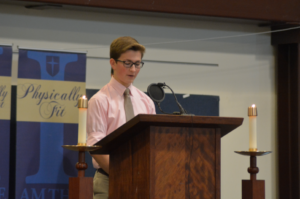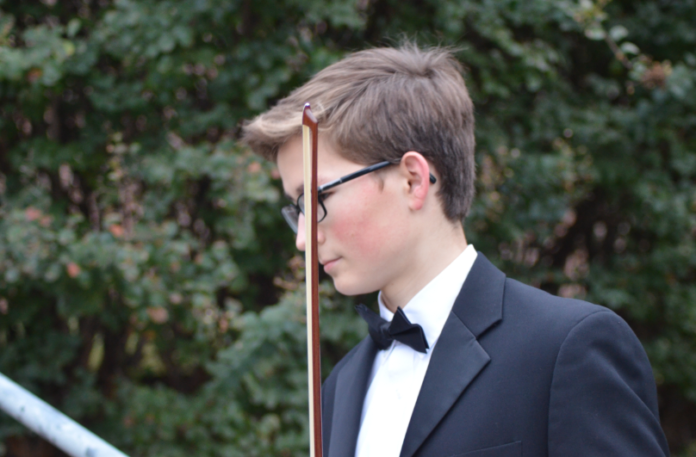3 am. Sweat dripping down his face, a hard-working Junior labors away at another physics problem set. Eyes dilated, face winced, he looks with existential dread at the unread pages of the Iliad. Quiz? Test? Essay? Homework? For many, sacrificing sleep is simply the price one pays for academic success. Surely there had to be a better way?
Meet Will Nickols ’20. Nickols, a top student in the class of 2020, powerlifter, student body vice-president, competitive pianist, and medical society vice-president shared his keys to efficiency and time management with The Roundup.
What’s Your Overall Academic Strategy?
I try to keep up with dates and get assignments done as soon as I have an opportunity to. For instance, for English revisions, I’ll try to set a meeting as soon as I get it back and get the revisions done within a few weeks. It’s important to stay on top of long term dates.

Weekly, it’s really important to find out when my tests and quizzes are that week and organize my homework schedule around that. So if I know that Thursday is going to be a big test day, I’ll try to get a bunch of homework done for Friday, Monday, and Tuesday on a night before.
Daily, a lot of it has to do with using free periods to get the written homework done. I find that I can get most of my written homework done at school, but actual studying I have to do at home or on the car ride to school. Since my parents drive me to school, I can study the whole ride there.
How do you use free periods?
I just have one free period plus lunch. I always reserve lunch to hang out with friends. Sometimes I’ll go to talk to teachers this period. During my free period, if I have quizzes or tests later that day that are important that I really need to study for, I’ll study for that. Otherwise, I’ll get ahead on the night’s written homework–like Latin translations or MyMathLab.
Do you listen to music when you study?
Not during my free periods, but usually at home. I think the key for music is that if I’m doing anything with numbers, it works fine, but if I’m writing or doing something language based, the words interfere.
How do you organize your homework?
First, I’ll get every written assignment done that I can. I try to structure it so I do an English and then math, then another English based, then chemistry; something to break up the sides of my brain that I’m using. It helps me be more efficient.
In terms of quizzes and tests, I don’t do a whole lot of multi-day studying for them. Usually, I can get away with studying the night before and the day off until I have that class.
In general, I do written work first–anything I can check off the list and be done. For me, I’ll just keep studying over and over if I have the time, so I have to force myself to get the written stuff done first. Otherwise, I feel like it might not happen because I’m too focused on studying.
How do manage your studying and avoid over studying?
There are a lot of studies that show that studying before you go to sleep and then sleeping between when you study and take the test is proven to be a lot more effective than studying and then taking it. I try to always study at least one run through of everything I have the next day the night before, and then the day off, I can focus on extra stuff I might have missed.
Another key is to set a time for when you need to be asleep so that you can get eight hours. For me, once that time rolls around, I’ll go to sleep and figure it out tomorrow.
One thing that shocks many people is that you do well academically, but you also sleep. How do you manage sleep, academics, and extra-curriculars?
In powerlifting, our coach keeps pounding over and over is the rest and recovery phase of our training, and sleep is super important to that. There are so many studies that show that you feel better, and you can perform better in your sports and school if you sleep more.
So what I try to do a lot is limit Youtube, Netflix, stuff that just takes time. It’s still fine to do that on the weekends, but during the school week when it’s a trade-off between sleep and Netflix, make sure sleep happens.
Getting homework done during free periods, or during classes, if we’re not actively doing something helps to relieve the stress for later in the day so I can get more sleep. I do a lot of extracurriculars; I usually practice piano for 1-1.5 hours a night, so a routine is really important. A lot of the time if you’re unsure of what you’re going to do next, you can get bogged down in distractions.
What’s your afternoon routine?
Nickols’ Monday Afternoon
3:40-4 Medical Society meeting
4-5 Powerlifting
5-5:30 Drive home; Duolingo Spanish lessons
Eat a proteinous snack
5:30-7 Piano and violin practice
7-7:20 Family dinner
7:20-10 Written homework and any studying
10pm-6:30am Sleep
Do you have any particular fruits that have aided your academic and athletic performance?
Yes! Specifically kiwis. I read some articles and apparently, they are really good for you and they taste amazing. I eat at least two kiwis each day; that’s three days worth of vitamins in two kiwis. The nutrients help fuel the brain.
Any advice for Jesuit students looking to increase their efficiency?
A big key is taking advantage of unexpected time. If a teacher happens to have a sub and there’s not really a plan that day or if you have a free period, the key is to get all that written homework done so that you can free up some time.
That way you’re guaranteed to have your homework done if that’s an issue, and you’re guaranteed to have more time to study. Utilize those small little moments in the day when you might otherwise get distracted or just pull out Snapchat.
Stay tuned to The Roundup for the latest study tips and ticks!






